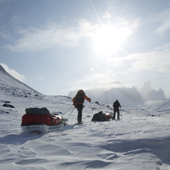Abstract: I was slow in coming to see the desperate need of sustainability education, in part because of a missed opportunity in my field of outdoor adventure education (OAE). Although a burgeoning set of scholars agree that OAE is strategically placed to educate for sustainability, little change within our discipline has occurred. To encourage the transition, this paper has four central aims. First, I contextualize the implications at stake by summarizing recent scientific predictions around climate change. Second, I differentiate sustainable OAE into the sustainability of OAE (e.g., its practices, footprint size, etc.) and OAE for sustainability (e.g., curricula that promotes education about sustainability), noting that despite long-standing petitions to address both, progress has been made in neither. Third, I celebrate, with others, the inherent potential that OAE has to promote sustainability through its educating in natural environs, within living/learning communities, which utilize physical/sensory, affective and intellectual ways of knowing that inspire critical impulses. Fourth, I outline the central changes that need to occur in order to create sustainable OAE. The foremost change needed is for OAE programs to curricularly commit to promoting a sustainability worldview, including values, knowledge, dispositions, and agency related to environmental, social, and economic justice. However, change of this depth will require a revision of OAE course offerings that allow for multiple and prolonged participant engagement over time. Such engagement, then, necessitates that OAE shift its emphasis from remote and sublime landscapes, to programs that not only connect participants to the places in which they reside, but cultivate a care and affection for them. This appreciation can be created through a combination of adventurous learning and microadventures. In sum, “local landscapes, far more often, as a way of life” encapsulate the changes OAE might make in contribution to the global need of sustainability.
Continue Reading
Adventure has been incorporated into sustainability education in a variety of ways, including through outdoor education and, more recently, through technology-enhanced learning. Technology has, for example, expanded opportunities for experiential learning through adventure as well as allowing learners to journey virtually along with explorers and scientists to the far-reaches of the world. This paper offers an overview of how adventure has traditionally been employed in both formal and informal education, discusses the differences between adventure education and adventure learning, shares research conducted on the role of adventure in the GoNorth! Adventure Learning Series, and advances suggestions for how adventure might be employed in sustainability education using distance, online, and mobile learning. The researchers propose the user-driven adventure learning environment (UDALE) as one model that educators and designers can draw from in both formal and informal learning settings as a means to fuse adventure, technology, and sustainability education in a pedagogically meaningful way.
Continue Reading